A Kennedy loses in Massachusetts and a storied dynasty fades

- Share via
WASHINGTON — The 2020 political season has delivered a lot of curveballs, and here’s another: For the first time in U.S. history, a Kennedy has lost an election in Massachusetts.
Sen. Edward J. Markey’s ability to beat back a challenge from Rep. Joseph P. Kennedy III in the state’s Democratic primary Tuesday was a tribute to the incumbent’s skill at organizing progressive activists behind him against a scion of a storied political family.
It was also a tribute to a broader political dynamic that reaches beyond Massachusetts and the Democratic Party: The loosening grip of family dynasties in American politics.
In both parties, the Old Guard has been challenged by the rise of populist movements: the white nationalism that brought Trump to power in the GOP, and the multiracial progressivism that nearly gave Vermont Sen. Bernie Sanders the Democratic presidential nomination.
With the rise of those anti-establishment forces, some of the most famous names in politics have been thrown to the sidelines in the last five years: Clinton. Bush. Romney.
Being a Kennedy in Massachusetts gave the 39-year-old the momentum, money and political connections to have a good shot at unseating Markey, a 74-year-old who has served more than four decades in Congress.
But it was not enough to get Kennedy over the finish line. Three hours after polls closed Tuesday, the Associated Press declared Markey the winner in one of the nation’s most hotly contested primaries.
“The Kennedy name has lost some of its magic in the Bay State,” said Jim Manley, a longtime advisor to the late Sen. Edward M. Kennedy (D-Mass.), who was Joseph Kennedy’s great-uncle. “Things are changing and a political dynasty doesn’t mean what it used to.”
Markey is all but guaranteed to win reelection this fall in the heavily Democratic state. Kennedy loses his House seat, which will leave Congress without any members of the Kennedy clan for only the second time in 73 years. (There were no Kennedys seated there in 2011-12.)
Political dynasties are fading at the presidential level as well. In each of the last eight presidential contests, the lineup of major candidates has included at least one member of the Bush, Clinton or Romney families.
Many had expected the 2016 race to be a clash of dynasties, when former First Lady and Secretary of State Hillary Clinton seemed likely to face off against Jeb Bush, a brother and son of presidents. But Donald Trump, a businessman outsider with no political pedigree, beat them both.
The previous GOP presidential nominee, Mitt Romney — son of the Michigan governor who ran unsuccessfully for the Republican nomination in 1968 — has been sidelined by his own party because of his outspoken criticism of Trump.
Plenty of legacy politicians remain on the scene, but their pathways are not unobstructed.
Donald J. Trump Jr. may try to succeed his father in 2024, but many ambitious Republicans have the same idea.
Liz Cheney, daughter of former vice president Dick Cheney, is in the House GOP leadership and has designs on moving up — although she faces resistance from Trump loyalists over her occasional criticism of the president.
New York Gov. Andrew Cuomo — son of the late Gov. Mario Cuomo — is seen as a possible presidential contender, but his centrist pragmatism puts him at odds with progressives, and he chose not to run in 2020.
No family has a legacy as broad and deep as the Kennedy clan, which has produced one president, two senators, and three House members. Most came from Massachusetts. None of them ever lost a race there. Until Tuesday.
Ever since Kennedy — a fourth-term House member who is the son of former Rep. Joseph P. Kennedy II and grandson of Robert F. Kennedy — announced his challenge to Markey, it was seen as more of a generational clash than an ideological one because the two differ little on issues.
Kennedy was almost immediately seen as a front-runner, enjoying double-digit leads in some polls. Markey — first elected to Congress in 1976, before Kennedy was born — has been a low-profile senator with a relatively thin record of legislative accomplishment.
Some Kennedy boosters assumed Markey would retire rather than face a bitter fight. The 2020 campaign season had been littered with insurgent candidates beating longtime incumbents in New York, Illinois and Missouri.
Massachusetts Rep. Joseph P. Kennedy III, a scion of one of America’s most storied political families, is set to announce he will challenge U.S. Sen. Edward Markey in the state’s Democratic primary in 2020.
That did not happen. Markey fought back aggressively and flipped the script that had bedeviled other embattled incumbents: He presented himself in ads and campaign messaging as the insurgent fighter from a blue-collar town — “Markey from Malden” — against a privileged member of the political elite.
He traded on his decades of work on climate change, a top priority among young Democratic voters. In a game-changing endorsement, he won the backing of Rep. Alexandria Ocasio-Cortez of New York, the rising progressive star with whom he’d cosponsored the Green New Deal. She immunized him against the rap that he was too old and irrelevant.
“When it comes to progressive leadership it’s not your age that counts. It’s the age of your ideas,” she said in an ad.
Kennedy initially tried to downplay his family ties — until Markey went after them and ended one ad with a tagline resonant of President Kennedy’s inaugural address.
“We asked what we could do for our country. We went out, we did it,” Markey said. “With all due respect, it’s time to start asking what your country can do for you.”
Kennedy defended his family, accusing Markey of “questioning their integrity, weaponizing their history, appropriating their words.”
“If he wants to talk about the Kennedys, then I will talk about the Kennedys,” he said.
The increasingly personal campaign vaporized Kennedy’s polling lead, suggesting that the Kennedy name was not the political talisman it once was. It had, after all, been 14 years since a Kennedy was on the statewide ballot.
“Since then, a lot of Democrats in Massachusetts have come into the process because of Barack Obama in 2008,” said Mary Anne Walsh, a Democratic consultant in Boston. “It’s a different kind of politics, a different kind of activism.”
Markey made an implausible connection with young insurgents through Ocasio-Cortez, as well as endorsements from Sen. Elizabeth Warren and some of the progressive congressional candidates like Missouri’s Cori Bush who had ousted incumbents elsewhere.
The Kennedy name may have been a liability as well as an asset if he was trying to make the case for generational change.
“Kennedy got the benefit of being a Kennedy, but he also got the problem that it’s hard to look like the challenging underdog,” said former Rep. Barney Frank (D-Mass.), who retired in 2012 from the House seat that Kennedy won with only token opposition. “The advantage that led him to clear the field in the first place took away from him the mantle of the daring young outsider on the flying trapeze.”
More to Read
Get the L.A. Times Politics newsletter
Deeply reported insights into legislation, politics and policy from Sacramento, Washington and beyond. In your inbox three times per week.
You may occasionally receive promotional content from the Los Angeles Times.












